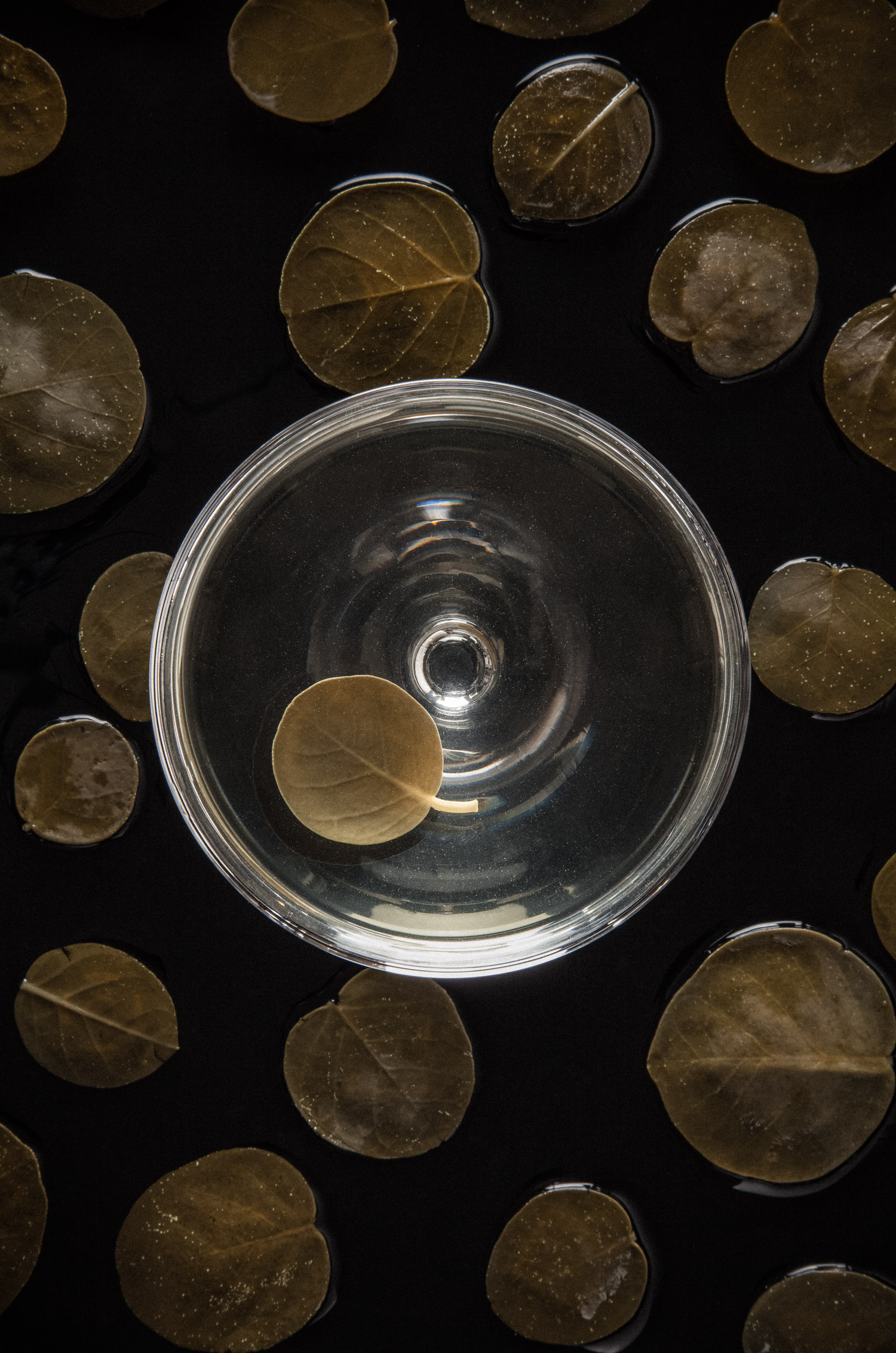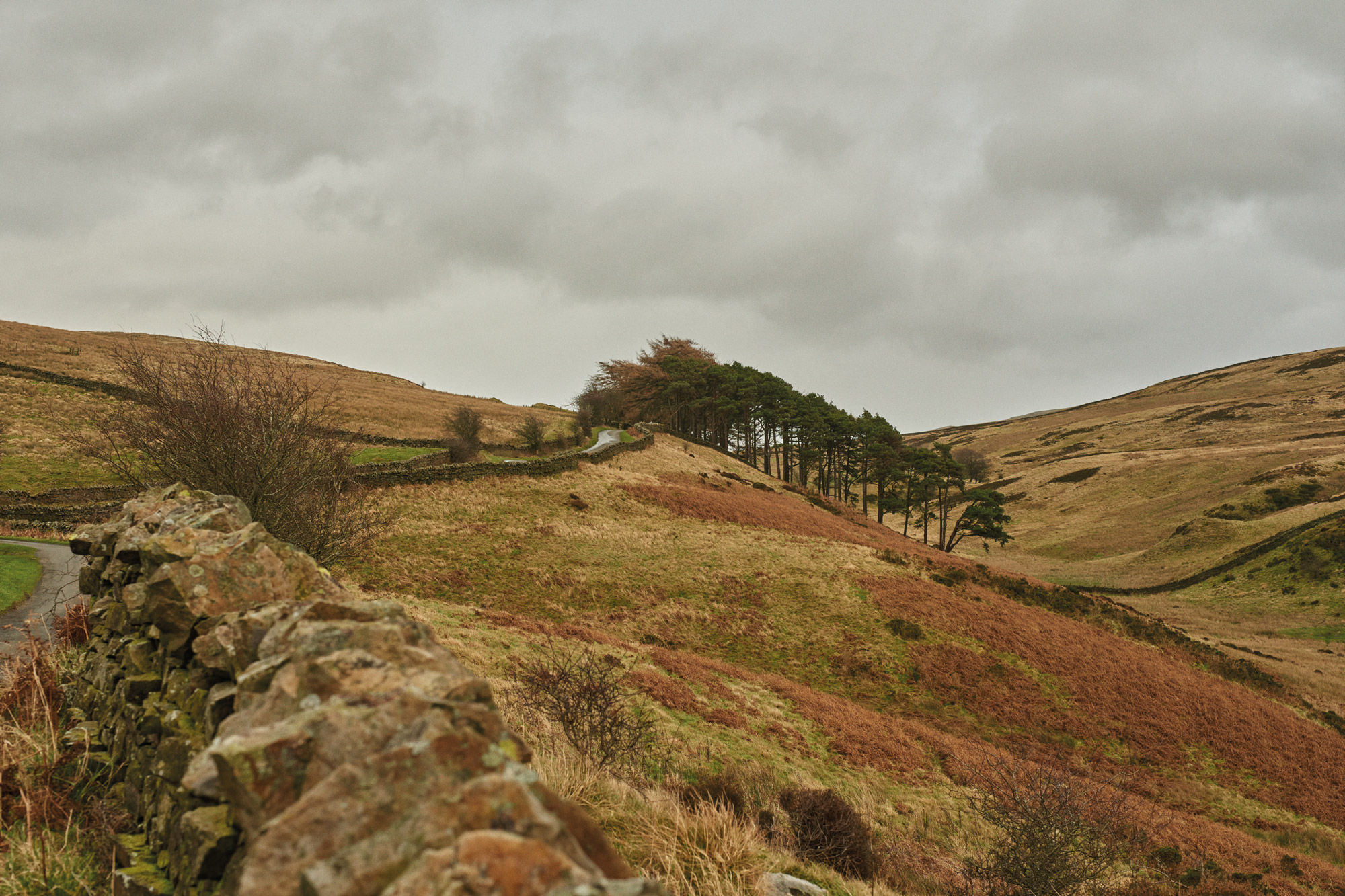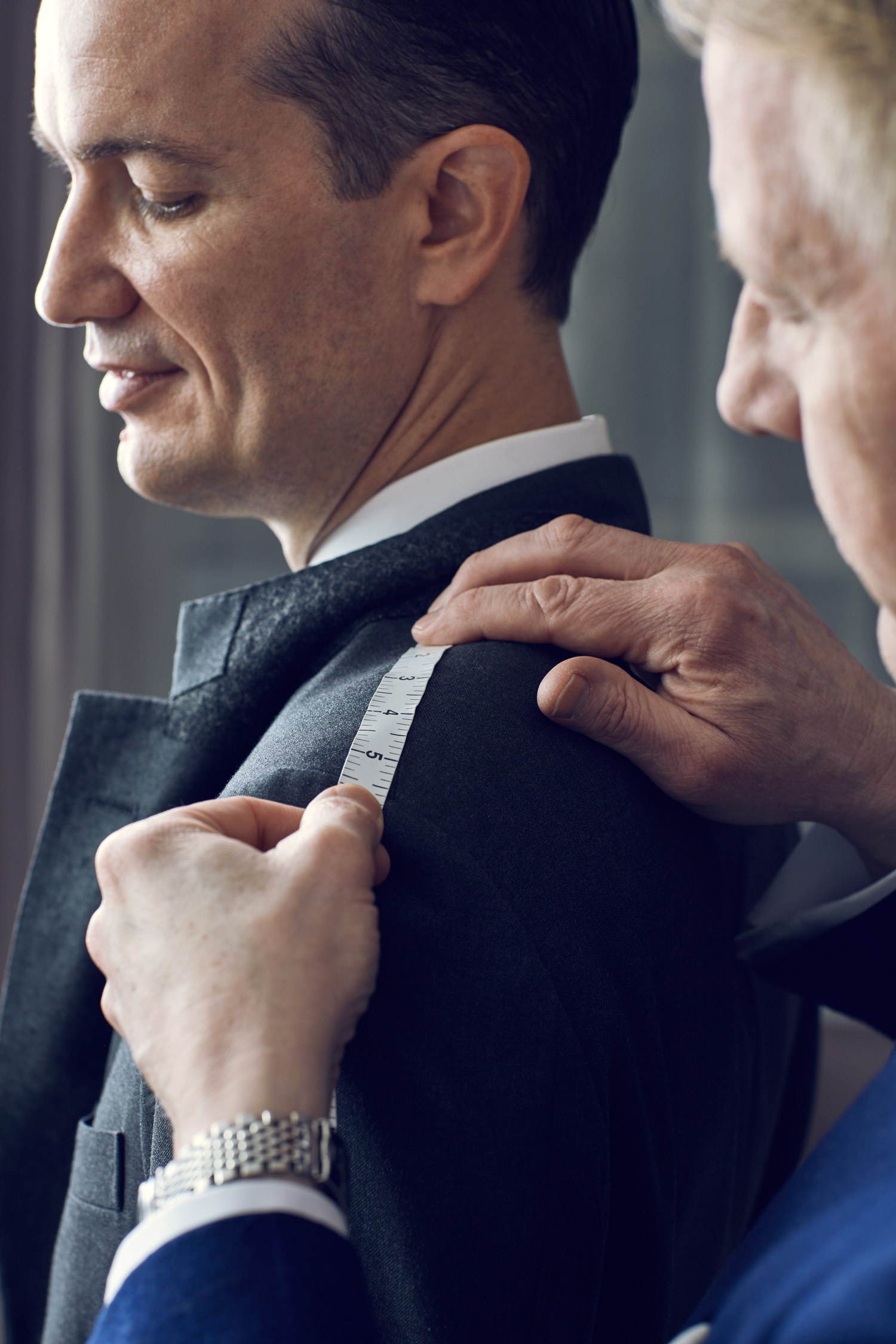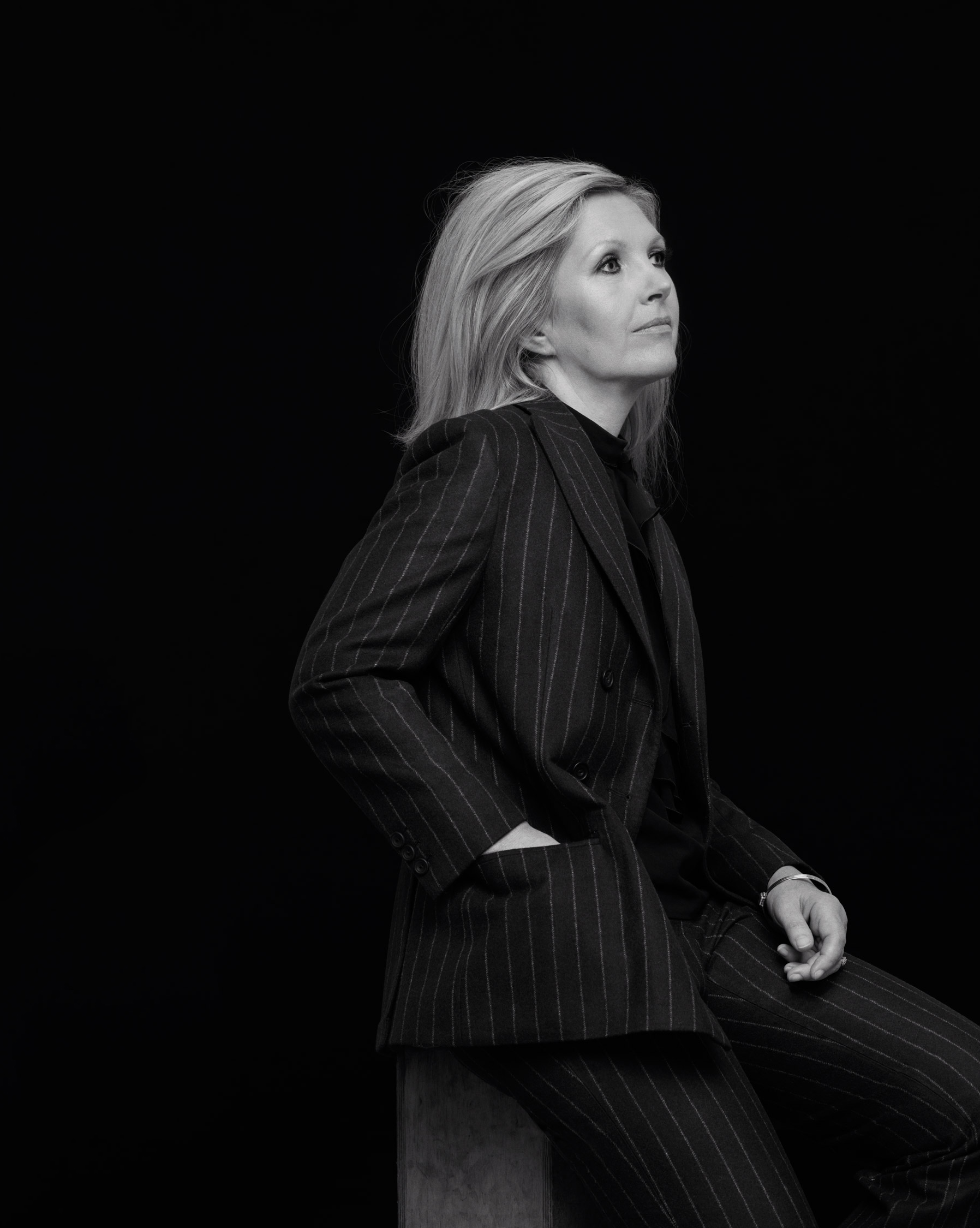The House lights are down. That’s ‘House’ as in the restaurant at the National Theatre on London’s South Bank. Tom Burke sits alone at a table in the darkness. Perhaps it’s an appropriate visual metaphor: the actor is immersed in the middle of a six-week block of rehearsals for the Terence Rattigan play The Deep Blue Sea. He’s preparing to play Freddie Page, an RAF pilot crippled by guilt for surviving WWII who embarks on an affair with the wife of a high court judge, with consequences as devastatingly powerful as a tidal wave.
If you stare into the abyss, Nietzsche famously said, then it stares back; the unusual nature of his profession means that Burke is spending all day every day not so much eyeballing the abyss as wallowing in it. But plumbing the depths of despair on a daily basis leaves no psychic water damage on him, he insists. If anything, it’s a perk of the job. “The world is a dark and difficult place,” he says. “You’re either looking at that or you’re looking away from it, which is what we all do most of the time, but if you do that all the time, that’s when you go really mad, I think. It’s good to check in with that stuff.”
Burke is no stranger to dark material on stage or screen. His dramatic range of complicated characters extends from Philip Carvel, the environmentalist scientist who creates a serum to sterilise 95% of the population in Channel 4 conspiracy drama Utopia to hard-drinking, scene-stealing cad Dolokhov in the recent BBC adaptation of the Tolstoy doorstop War And Peace. The closest Burke has come to the glare of the Hollywood spotlight was as the raping, murdering older brother of Ryan Gosling in the film Only God Forgives, an ultra-dark, ultraviolent foray into Bangkok’s neon-soaked criminal underworld. On this occasion, the darkness did have an effect.
“When you’re filming at night, your brain does weird things,” says Burke. “I remember saying that I wanted to dress like one of those pensioners you see going round a National Trust property. I’m not sure where it came from: something to do with being sick of wearing skinny jeans. Ryan started saying, ‘Do it! Do it!’ And I thought, ‘No, because if I start doing that, I’d get phone calls asking if I’m okay, whereas if Ryan started doing it, it’d be the new thing.” Gosling is not the only latter-day style deity for whom different rules apply: “He was like, ‘Tom Waits used to dress like an old man.’ And I was like, ‘Yeah, but he’s Tom Waits.’”
Stylistically, Burke is more a disciple of David Hockney: “I’ve always thought he was the coolest guy ever, so I’ve quite liked the slightly haphazard, loose-fitting stuff.” Did Burke draw any inspiration from the dress sense of Gosling, frequently hailed as one of the fashion luminaries of our age? “Well, he was mainly wearing a vest, because it was boiling hot in Bangkok — although freezing whenever you went inside, because they had the air-con on, which was very disorientating,” says Burke. “But it looked cool on him because he’s, well, cool.” There was, however, one moment of sartorial enlightenment: “I was with Ryan the day they were picking out his suit for the last section of the film,” says Burke. “He was saying that he wanted the lining to be visible on the back of his waistcoat, all this stuff. I thought, ‘Yeah, I’d be saying that, too.’ It was nice to spot another actor who’s into the colours and the cut.”

That Burke really is into the colours and cut becomes quickly apparent when talking about his English Cut fitting. “It was great,” he says, immediately lighting up. “I wanted something really classic because I’ve had the privilege to wear lots of old suits in a lot of the work I’ve done and they’re so comfortable.” That would be stuff like 50s-set BBC newsroom drama The Hour, 60s-set music industry film Telstar and Agatha Christie: Poirot, which is not always easy to detect but typically pre-WWII. “Actually Poirot is a bit too stiff,” adds Burke. “But Telstar and The Hour, those suits were the comfiest clothes I’ve ever been in. And they weren’t even made for me — they were just great old suits.” He’s much less fond of what he calls “these tight, modern things”, which was music to Tom’s ears: “Every time I said something he was like, ‘Oh yes, oh yes.’”
This old-fashioned view is reflected in the design of Burke’s new three-piece, which he runs through like a script he’s memorised: “High waist and single pleats, although double pleats were discussed. I was going to go two-button but we talked about the three-button where the lapel rolls over, which I liked.” Meanwhile, he weighed up his choice of fabric more painstakingly than Hamlet did life or death. “I love chalk stripe, particularly grey-on-grey, which I don’t seem to be able to find anywhere, so I nearly went for that,” he says. “But then I thought everyone needs a dark blue suit: it’s a staple.” With direction from Tom, he finally opted for a blue fresco, which is light and comfortable without being too linen-y. “I’ve always been a bit on the fence about linen,” says Burke. It’s great if you’re on holiday. But in London, I would feel like I was doing a Chekhov play…”
“I can’t even remember how I like having my hair. It’s so dictated by the job I’m doing. Sometimes you have a haircut you don’t like for months. And then you go, ‘Actually, I don’t know…’”
Burke loves fabrics like Romeo loves Juliet. “Any kind of fabric: home furnishings,” he says. “I don’t know what it is. Maybe I was some sort of cloth-maker in past life…” Certainly he has had previous experience of the bespoke process. “I had some waistcoats made recently, one from a fabric that I had found,” he says. “Finding something, choosing all the little details, I just absolutely loved it…” Despite this passion, tailoring doesn’t play a leading role in his wardrobe. But he’s always liked a nice suit. “There used to be a second-hand designer place on Monmouth Street [in Covent Garden], and there was obviously a guy the exact same shape as me who kept getting rid of stuff,” he says. “I had a Vivienne Westwood one, Alexander McQueen… all sorts. They weren’t cheap – but then it’s so easy to fill your wardrobe with a load of shite!”
It should come as no surprise that Burke gets “incredibly involved” in the costumes of his characters. More surprising, perhaps, is that they also get involved with him. “My agent pointed out that I do seem to shift my daily dress to the character I’m playing, which I hadn’t really realised,” he says. “But I look back on when I played Romeo: I’d always wanted to play the part, but I wasn’t very happy in the production that I was in. So I was wandering around every night until 3am just thinking, which is what Romeo’s doing at the start of the play, and I thought, ‘Is that him? Is that me?’” Burke is at pains to point out that he’s not overly “mystical” about the profession. But frankly, it makes perfect sense that when you have to walk in somebody else’s shoes — and haircut, which you can’t take off at the end of the day — a certain amount of crossover might occur. “I can’t even remember how I like having my hair,” he says. “It’s so dictated by the job I’m doing. Sometimes you have a haircut you don’t like for months. And then you go, ‘Actually, I don’t know…’”
You could say that Burke was doomed — nay, star-crossed — to tread the boards. He grew up in Stratford-upon-Avon, home of Shakespeare — and the Royal Shakespeare Company, of which his actor parents, David Burke and Anna Calder-Marshall, were members. His godfather was Alan Rickman: “I would call him all the time about stuff. And the times I didn’t, I should have. He had the knack of asking the right questions.” The realisation that he was destined to act dawned on Burke early, before he even really understood what theatre was. “I knew it was this place where the lights went off,” he says. “I remember wandering onto a stage in the middle of their technical rehearsal. There was a sort of space like this” — he draws a circle with his hand — “and then it was pitch black. I was just standing looking out, as if I was on a shuttle floating in space. That was totally thrilling to me.” For that reason, he still gets a kick out of so-called “black box” theatre, as opposed to the current trend for more immersive performances: “I completely think that’s brilliant and valid and I get why it’s a whole new thing. But I love that remove — as an audience member as well.”
As a child, Burke immersed himself in the costume box. “I liked dressing up,” he says. “I was curious about romance and heroism and all those obvious things that you’re flooded with: Disney movies and whatever.” His motivation also came from a darker place. “I was curious about things like cruelty,” he says. “I came from a happy, loving home. But all children know what cruelty looks like. They see it in the school playground.” Now, Burke gets labelled with playing “dark” characters. “I don’t tend to come at things moralistically,” he says. “I just think there’s too much of that in the world already, be it in the church, the courts or the papers. I try to remove myself from that.” Besides, morality is not black and white. But there is some truth in the cliché that the villains get all the best lines: “Yes, playing somebody who is evil, or whatever people would call it, is more interesting than somebody who is preaching the collective wisdom.”
Whether Burke is choosing roles or suits, the devil is in the details. Deeply thoughtful, he’s possessed of the kind of enquiring mind that can construct a hinterland of character from a one small remark like “He smiles but never laughs”, as Athos, who Burke played in BBC series The Musketeers, is described at one point in Alexandre Duma’s massive novel. “It’s a huge detail!” the RADA-trained Burke retorts. “But you have to know how to read a script and get all the circumstances. I’ve had the great privilege to go to a good drama school. Some people who go straight into TV don’t think in those ways.” That hothousing gives rise to what his parents called “microwave acting”: quickly prepared, not nourishing. But then, a microwave is not an easy place to be. “Here at the National you get six weeks to prep, which is minimum,” says Burke. “With filming, you’re up against it. In the way that a rehearsal room can feel a bit like a church, a film set is like an airport: people hollering; wires all over the place. You’re sent off somewhere then suddenly you’re called back.”
Actors are often talk about — or rather are asked about — their “process”, which implies something mechanistic, summoned on cue. But according to Burke there is no recipe for getting into character, much less a button that you can press and ping! Action. “It sort of evolves,” he says of his own approach. “Somebody once said it’s like carving steps in snow. Whenever you think you’ve got it handled, the rug comes out from under you. The only thing I’ve been taught that has stayed with me is that it’s more important to ask questions than to have answers.” One of the first is whether you want to be there in the first place — which Burke doesn’t always answer in the affirmative. “Some people just love it: you look at them in the wings and they’re like athletes on a starting block,” he says. “For me, and an awful lot of people I know, it’s like there’s an invisible walking stick around your neck.” He’s become more comfortable though with being uncomfortable: “That’s a good thing. It stops it being somewhere comfy-cosy.”
But being comfortable in his clothes helps. “All that stuff’s got to be right,” says Burke. “If you don’t feel right, it’s not to be ignored.” That too can take a while. “Sometimes when stuff is made afresh, it looks so new,” he says. “It’s only in the last week that it starts to mould to your shape.” When it’s right though, the costume can inform the performance rather than inhibit it: “It’s funny, even somebody saying the character would be wearing this colour can change the way you think about them a bit — make you think of them a different way.” And after the curtain call, taking off the costume helps to reinforce the divide between fantasy and real, character and actor, like shedding a skin. “If you run down straight and start talking to somebody at the bar, you can feel a bit manic,” says Burke. For that reason, he takes a moment first — and a shower: “You’ve been putting your body through something and your body doesn’t know that it’s a lie.”
Offstage, Tom Burke has worn many costumes. “I’ve dipped my toe into various vaguely gothy, rockabilly things that got ironed out in my late 20s,” he says. “I’ve gotten to the point now where I do start to think ‘Should I start dressing a bit more — for want of a better word — conservatively?” If not quite like a pensioner on a National Trust property. But character, like costume, changes: who we think we are is not always who we actually are, or who we become, which is the thread that leads to Burke’s ultimate “motivation” as an actor, beyond fame or fortune. “Being part of an arena that offers people the opportunity to unravel,” he says. “Not to walk out informed, or moralised, or indignant: to unravel. I think that’s quite precious. I don’t know where else you can do that. And it doesn’t happen in an awful lot of theatre. But if the circumstances and conditions are right, that’s what it can do. That’s what it does for me, and why I’m into it.”
What exactly does he mean though by “unravel”? No less than pulling apart our carefully measured constructs, to try and identify the fabric that makes up our true, ever-shifting selves: “‘I thought I was that, but I might be that. Am I that? Am I more than that? Am I less than that?’ And I think that’s why I love the darkness. You unpick yourself a bit.”



